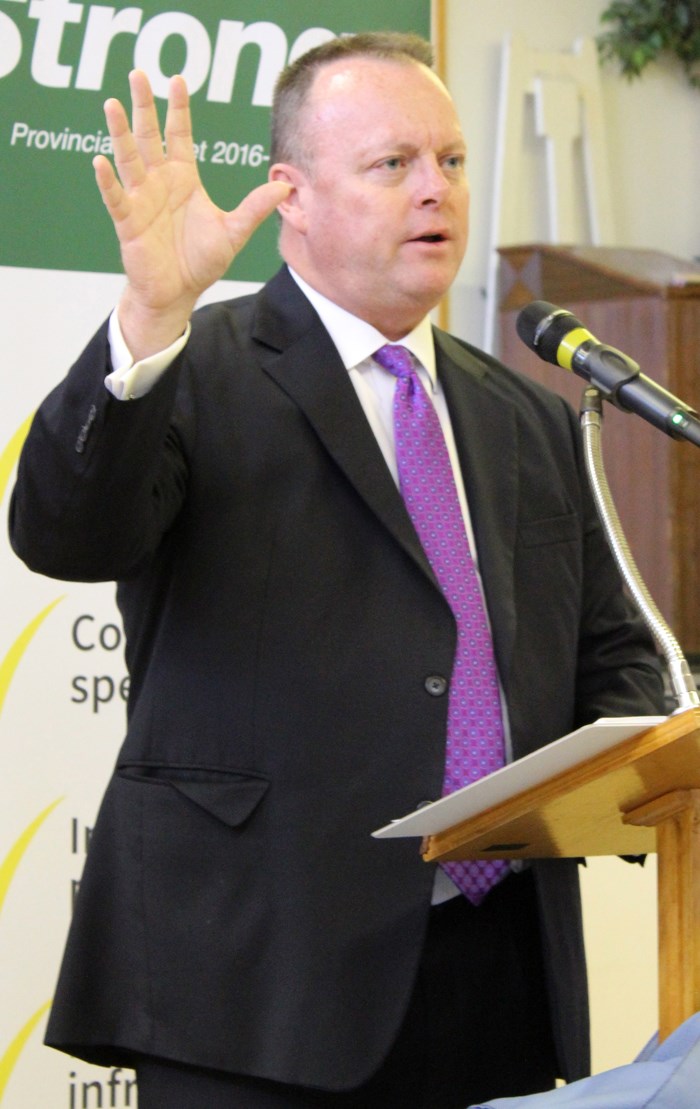The Yorkton Chamber of Commerce welcomed Saskatchewan Finance Minister Kevin Doherty for a special luncheon event at the Legion Hall Friday.
The minister is on an election campaign style province-wide tour he touts as “providing context” for the 2016/17 budget, which he released earlier this month.
As such, there was nothing new in Doherty’s speech.
The big context, of course, is more than a $1 billion shortfall in natural resource revenues resulting in a $434 million operational deficit. The Province is also borrowing $1 billion to keep capital projects, such as the Regina Bypass, and locally, the new Langenburg school on track.
Doherty told the gathered business people the government felt it was prudent to run the deficit given the economic downturn and noted it was a good time to borrow with interest rates at historic lows.
He said it was important not to get caught up in a Saskatchewan bubble, but to compare ourselves to other provincial jurisdictions.
In that regard, he boasted that Saskatchewan remains one of only two provinces with British Columbia to possess a Triple-A credit rating.
On the positive side, he also cited Saskatchewan’s debt-to-GDP ratio, which at 17.6 per cent is the second lowest in the country trailing only Alberta. He compared that to B.C. (28.5 per cent), Ontario (47.6), Manitoba (57.5) and Newfoundland and Labrador (63).
While deficits and borrowing softened the blow this year, there is some nervousness about the “transformational change” the government has promised in its new four-year mandate.
Doherty took some time to answer questions from local media about the more that transformational change.
With respect to last week’s announcement by Prairie Spirit School Division that it will lay off 74 classroom staff to deal with a shortfall in funding for a 1.9 per cent negotiated settlement with teachers, Doherty said overall funding for education is increased in the most recent budget, as it is for all three of the government’s priority areas, health, education and social services.
He said the Saskatchewan Party has doubled education spending since it came to power in 2007, which exceeds enrollment and inflationary considerations.
“I can’t comment specifically on the decisions that [Prairie Spirit has] made with respect to their staffing levels,” he said. “I don’t know the level of [Educational Assistants] they had with respect to other school divisions, whether it was disproportionate or an appropriate number, it would be best to ask the minister of education or the board chair.
“What I do know is we have found additional dollars for school divisions across the province in a very very difficult budget. We’ve lost a billion dollars in resource revenues over the last year; that’s a big hole to fill. So in the context of do we raise taxes, well, no, we promised during our campaign we would not raise taxes in this fiscal year. We maintain that promise. We found additional dollars for the priority areas as I identified.
“We are spending a record amount of money in capital in the K to 12 education sector in this coming fiscal year and subsequent fiscal years so the money is there to support the building of new schools and new facilities in the education sector. What we’ve asked our school divisions to do is work with us in finding efficiencies within your school divisions. You have to establish the priorities with respect to the dollars you’re getting from the provincial tax payer and if you need to make those kinds of decisions based on the dollars you’re getting, those are the decisions that that locally elected school board would make.”
For the minister’s full remarks on education, health care and muncipal governance please visit the online edition at www.yorktonthisweek.com.




